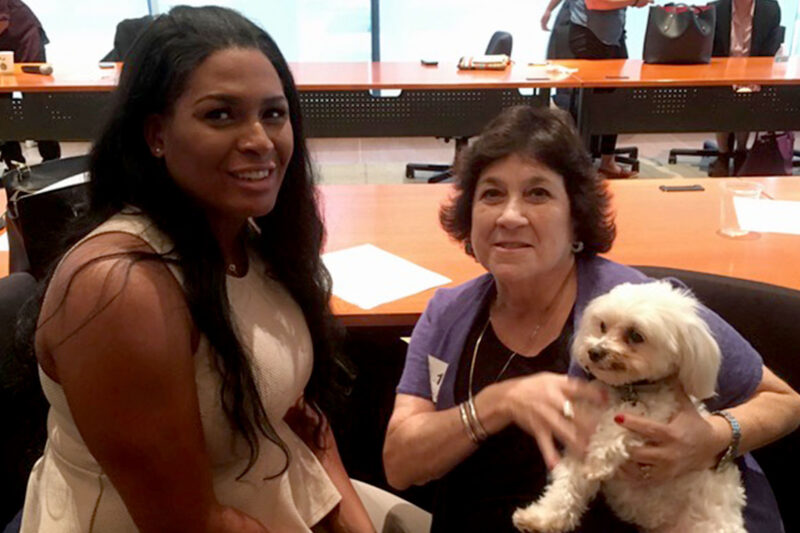
I am a queer woman who has been incarcerated. I was arrested for tax evasion and mail fraud 20 years ago. I was tried, convicted, and incarcerated – first in 2010. I was released shortly after that, when my conviction was overturned but then incarcerated again in 2013 and released in 2014.
My queerness made me a target of harassment and punishment by correctional officers. When I was released, I wanted to help shine a light on the abuses that queer and transgender women face in prison and to give these women a stronger voice.
In 2014, I started Witness to Mass Incarceration, a digital library and story-based advocacy project, to empower formerly incarcerated women and LGBTQIA people in the fight for alternatives to mass incarceration. I’ve interviewed many queer women and trans women about their experiences in prison and post-incarceration.
A year and a half ago, I met Zahara Green at the National LGBT/HIV Criminal Justice Working Group – a coalition of over 50 LGBT organizations, advocates, and formerly incarcerated LGBTQ people working to reduce the harm caused by the criminal justice system. Since then, I’ve had the privilege of interviewing her about her life.
Zahara left home at sixteen. She was arrested by age 19 for shoplifting. Facing an all-white jury in a rural county in Georgia, she pled guilty, she said, because “I knew this jury would convict me for being a trans woman.”
Zahara spent five years in prison with most of her time in solitary confinement. That is where most transgender women are housed. Under the guise of “protective custody,” correctional officers often put trans women into Special Housing Units — which often means solitary confinement. There they can be locked up for months, or even years. In a survey conducted by an advocacy group Black and Pink, 85 percent of nearly 1,200 LGBTQ prisoners reported they had spent time in solitary confinement. Just under half of those respondents had been placed in solitary confinement for two years or more.
Zahara was put in solitary confinement in several prisons in Georgia until she was incarcerated at Rogers State Prison for men, where she was placed in general population. Upon her arrival, she was sent to be stripped alongside of a roomful of men. As she started to take off her clothes, an officer stopped her and said, “hold on, hold on”. But the men already saw her stripped. The damage was done. When an officer trotted her out to general populations, she realized she had been let out to the wolves.
An inmate approached her at her bed and said to her, “You are going to need protection in a place like this. You are going to need a man to protect you.” She just stared at him. The first time Zahara walked into the prison cafeteria the man who had approached her earlier sat down next to her. He said, “I told my boys you are mine and they are going to be looking out for you.” He followed her everywhere the next week. He verbally threatened her and then physically assaulted and raped her. Zahara lived in a perpetual state of fear. “I felt this guy was going to kill me,” she told me.
She wrote her mother telling her she was in fear for her life and asked her mother to get her the names of senior level people in the Georgia Department of Correction to contact. Zahara decided to write the deputy warden, telling him the entire story and the name of the inmate sexually harassing her. She never heard from him.
Trans women are five times more likely to be sexually assaulted by prison staff than other inmates, and nine times more likely to be sexually assaulted by other inmates.
Zahara became an advocate for trans women while incarcerated. She started fighting the injustices that she and other incarcerated trans women face daily. She filed grievances, wrote letters, and began working on impact litigation.
Upon release from prison, Zahara changed her name, found a job, and quickly advanced into retail management. Like so many formerly incarcerated people, she experienced challenges along the way. It inspired her to establish TRANScending Barriers Atlanta, a trans-led and trans issue-focused non-profit that serves gender non-conforming people in Georgia. As founder, Zahara specializes in criminal justice advocacy for transgender women and fighting the abuses and discrimination these women face in the criminal justice system. She’s working to make sure transgender people have a place in this world.


